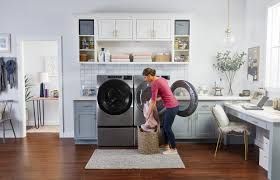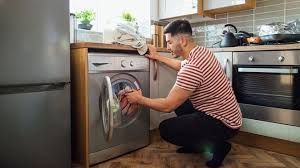Why Does My Washing Machine Stink?
Does your washing machine have a horrible musty smell every time you open it? Do you notice an unpleasant odor in your freshly-washed clothes?
Causes of mildew
Mildew often happens in washing machine because of excess moisture. If you use a front-loading washer but still put in the normal amount of detergent for a top-loading one, you’re using way too much soap. A front-loading washer uses about a third of the water that top-loaders do, so with less water available, there isn’t enough to absorb all the suds. Then soapy residue will stick to the insides of your washing machine (and your clothes), where it will eventually become mildew.
Use high-efficiency detergent
The ideal solution to avoid future continued problems is to use high efficiency detergent, which won’t have as much suds and made specifically for front-loading washing machine.
How Authorized Appliance Repair can help
Also make sure your washing machine is level on the floor. If your floorboards under the washing machine have warped, the water could be prevented from draining properly. A repairman from Authorized Appliance Repair can provide you with anti-shake pads to prevent the machine from shifting.
Break up with fabric softener
Liquid fabric softener could also be the cause of the mildew problem as well. It’s made of mostly wax, which can stick to the outer side of the washing machine tub, leading to a mildew breakout. If you use softener, always use as little as possible to avoid mildew issues. Or just avoid it entirely.
What to do now
But in the meantime, you’ve got a stinky washing machine on your hands. Get rid of the mildew by running a cycle with only bleach. Or mix ¼ cup of baking soda with ¼ cup of water and put it in the detergent compartment, and 2 cups of vinegar in the washing machine, running a normal load with high heat to get rid of the mildew. If stubborn spots remain, scrub them out with a sponge and a half vinegar, half water solution.
Preventative measures
For the future, keep your washing machine smelling fresh by keeping excess moisture at bay. When the cycle ends, always remove laundry promptly and when the machine isn’t being used, keep the door open so moisture can freely leave. Consider installing a ceiling fan and dehumidifier in your laundry room. Wet, warm areas are breeding grounds for bacteria and mildew, so do everything you can to keep your washing machine dry and cool. If you have a front-loading washer, the rubber seal is especially susceptible to mold build-up, so wipe it down once a week with a half vinegar, half water solution to keep bacteria at bay.
For all your washing machine maintenance needs, contact Authorized Appliance Repair at (833) 220-1666. We’ve been serving Southern California washing machines and all other appliances for over 42 years, so if your washing machine is giving you any problems, just call the experts at Authorized Appliance Repair.




